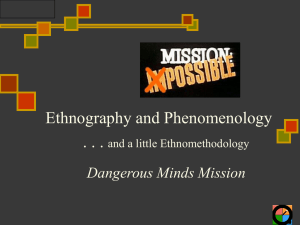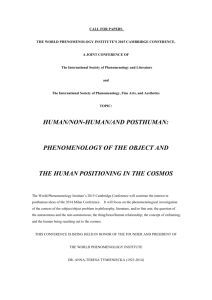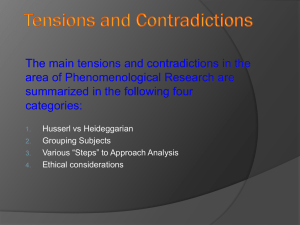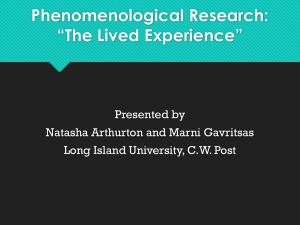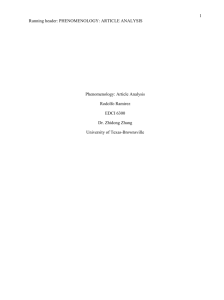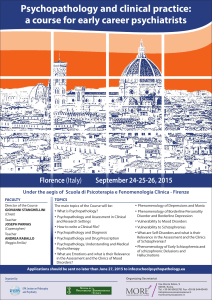Qualitative Paradigm: Phenomenology, Case Studies & Etnography
advertisement
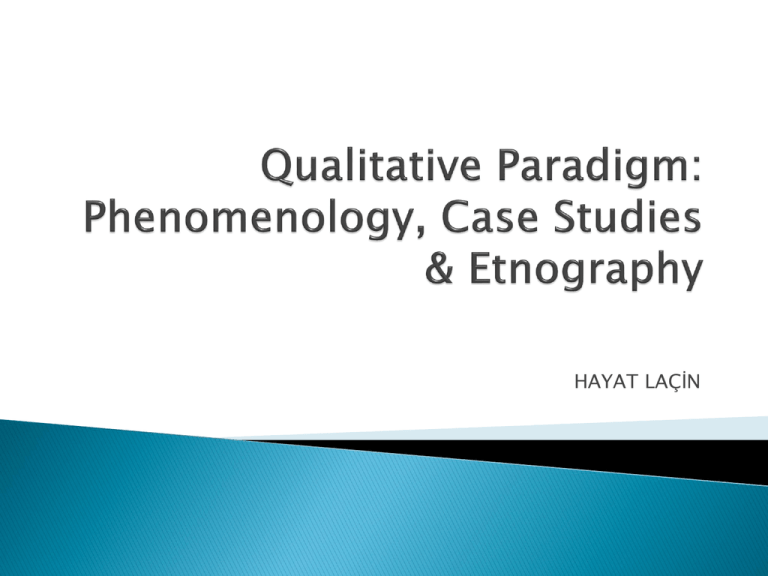
HAYAT LAÇİN Quantitative Research Qualitative Research Major Qualitative Traditions 1- Phenomenology 2- Case Studies 3- Etnography 4- Biography 5- Grounded Theory Phenomenology; - Definition, background, the aim and the types of phenomenology etc. Case studies; - Definition, background and the aim etc. Etnography ; - Definition, background and the aim etc. References Understand and talk about qualitative and quantitative research paradigms. See the differences between five major qualitative traditions. Understand the purpose of phenomenology, etnography and case studies as the major qualitative traditions. See the philosophical perspectives in phenomenology, etnography and case studies. Quantitative Research: Systematic empirical investigation of social phenomena with statistical and numerical data or techniques. (Given, Lisa M, 2008) To measure the incidence of various perspectives and ideas in a chosen sample. Used in social sciences such as psychology, economics, sociology, health and human development by asking specific questions and collecting numerical datas from participants. Exploring issues, understanding phenomena and aswering questions by analyzing and making sense of unstructured data. To understand human behaviour and the reasons that govern such behaviour. Investigates the ‘why and how of decision making’ not only ‘what, where and when’. Qualitative research is a method of inquiry employed in many different academic disciplines, but also in market research and further contexts. (Denzin,Norman K. & Lincoln, Yvonna S, 2005) Used for asking broad questions and collecting word datas from participants. Qualitative methods produce information only on the particular cases studied and any more general conclusions are only hypotheses . Quantitative methods can be used to prove such hypotheses are true. Phenomenology is the philosophical study of the structures of experience and consciousness. - Philosophical movement , early year of 20th century. Phenomenology is ‘the reflective study of the essence of consciousness as experienced from the first person point of view’ according to Edmund Husserl. ( Smith, David Woodruff, 2007) Hegel indicated that phenomenology is an approach to philosophy that begins with an exploration of phenomena. Phenomenology is the study of the shared meaning of experience of a phenomenon for several individuals. The basic purpose of phenomenology is to reduce individual experiences with a phenomenon to a description of the universal essence. (Manen, 1990) Types of phenomenology: - Hermeneutic Phenomenology (Manen,1990) -Empirical -Transcendental -Psychological Phenomenology (Moustakas, 1994) The researcher determines if the research problem is best examined using a phenomenological approach. It is important to understand several individuals’ common or shared experiences of a phenomenon. A phenomenon of interest to study is identified. The broad philosophical assumptions of phenomenology are recognized and specified by the researchers. The researchers collect data from the individuals who have experienced the phenomenon. The participants are asked two general questions about their experiences in terms of the phenomenon and how their situations are affected by these experiences of the phenomenon. Building on the data from the first and second research questions, data analyst go through the data and highlight ‘significant statements’. These significant statements are used to write a description of what the participants experienced. (textural description) From these descriptions, the researchers write composite descriptions that present the ‘essence’ of the phenomenon and these passages basically focus on the common experiences of the participants. A phenomenology emphasizes the meaning of an experience for a number of participants. The phenomenological research is used to identify a shared experience. The aim of the phenomenological research is to define lived experience of a phenomenon. The participants try to understand their life with the experiences and the researchers try to make sense of these participants by collecting datas. Investigations of ‘bounded systems’ with the focus being either the case or an issue illustrated by the case or cases. (Stake, 1995) Stake (2005) indicates that case study research is not a methodology but a choice of what is to be studied. Well known case study researchers: Robert E. Stake Helen Simons Robert K. Yin To define the research questions and determine whether case study approach is appropriate or not with the research questions. Selecting and identifying the cases. Determining data collection. ‘The data collection in case study research is typically extensive , drawing on multiple sources of information, such as observations , interviews, documents and audiovisual materials.’ (Cresswell, 2012) Determining of the types of analyzing of the data. Evaluating and analyzing of the data. Preparing a final reports about the meaning of the case, whether that meaning comes from learning about the issue of the case (an instrumental case), or learning about an unusual situation (an intrinsic case). (Cresswell,2012) A study of shared patterns of behaviour, language and beliefs. The aim ; -to examine these shared patterns. It is indicated that Ethnography focuses on an entire cultural group (Creswell,2012) Ethnography is used to describe and interpret the shared patterns of values, beliefs, behaviours and language of a culture sharing group. (Harris,1968) Ethnographers try to understand the meaning of the behaviour , the language and the interactions of the participants of the culture-sharing group. The Realist Ethnography: - A traditional approach which is used by cultural anthropologists . - Characterized by Van Maanen (1988) Reflects a particular stance taken by the researcher toward the individuals being studied. - An objective account of the situation which is written in third person point of view. The Critical Ethnography: (Creswell,2012) - A type of ethnographic research in which the authors advocate for the emancipation of groups marginalized in society. (Thomas,1993) - The issues of power, empowerment, in equality, dominance, repression , hegemony and victimization can be studied by critical ethnogropher. Ethnography is appropriate ? Creswell(2012) indicates that Ethnography is appropriate if needs are to describe how a cultural group works and to explore the beliefs ,language and behaviours . Identifying and locating a culture-sharing group to study. Selecting cultural themes or issues to study about the group. Studying cultural concepts, determining which type of Ethnography to use. Gathering information where the group works and lives. It is called as Fieldwork. (Wolcott, 1999) Making theme analysis. Forge a working set of rules or patterns as the final product of this analysis. After these procedures, the readers of the ethnographic research can learn about the culture-sharing group from both the participants and the interpretation of researcher. Creswell, John W. (2012), Qualitative Inquiry and Research Design: Chosing Among Five Approaches, Sage Publications. Retrieved 19.10.2014, from: http://www.google.com.tr/books?hl=tr&lr=&id=OJYEbDtkxq8C&oi=fnd&pg=PR1&dq=five+qu alitative+approaches+to+inquiry+creswell&ots=eO1g8JGhbn&sig=B3CjD6mZcpzmZUFJw68Ixw9PWU&redir_esc=y#v=onepage&q=five%20qualitative%20approaches%20to%20inquir y%20creswell&f=false Yin, Robert K. (2009), Case Study Research: Design and Methods. Retrived 19.10.2014, from: http://books.google.com.tr/books?id=FzawIAdilHkC&pg=PA119&dq=the+art+of+case+study+r esearch&hl=tr&sa=X&ei=glFIVM3kPKf6ywO4mYLIBQ&ved=0CCMQ6AEwAQ#v=onepage &q=the%20art%20of%20case%20study%20research&f=false Meriam, Sharan B. (2009), Qualitative Research: A Guide to Design and Implementation, John Wiley and Sons. Retrived 19.10.2014, from: http://books.google.com.tr/books?id=tvFICrgcuSIC&printsec=frontcover&dq=the+art+of+case+ study+research&hl=tr&sa=X&ei=glFIVM3kPKf6ywO4mYLIBQ&ved=0CFYQ6AEwBw#v=on epage&q=the%20art%20of%20case%20study%20research&f=false
